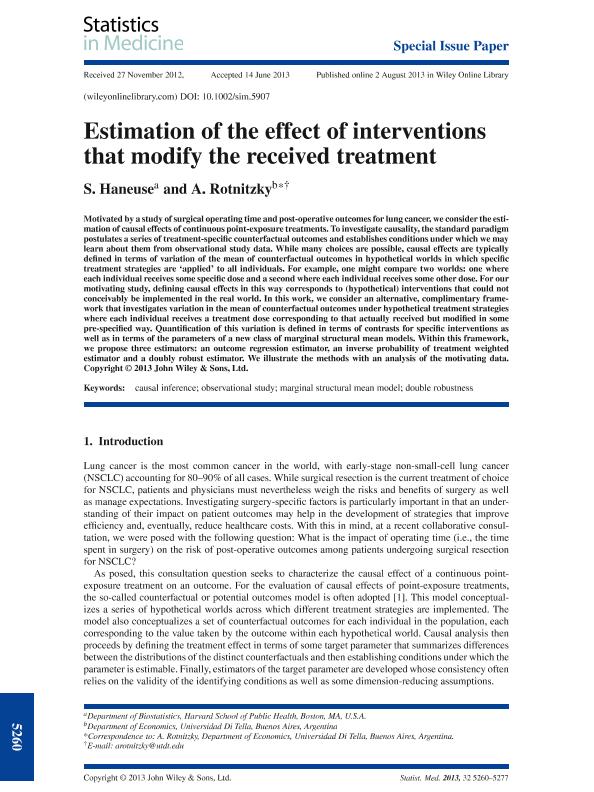Mostrar el registro sencillo del ítem
dc.contributor.author
Haneuse, Sebastian
dc.contributor.author
Rotnitzky, Andrea Gloria

dc.date.available
2017-10-13T20:14:33Z
dc.date.issued
2013-08
dc.identifier.citation
Haneuse, Sebastian; Rotnitzky, Andrea Gloria; Estimation of the effect of interventions that modify treatment; Wiley; Statistics In Medicine; 32; 30; 8-2013; 5260-5277
dc.identifier.issn
0277-6715
dc.identifier.uri
http://hdl.handle.net/11336/26640
dc.description.abstract
Motivated by a study of surgical operating time and post-operative outcomes for lung cancer, we consider the estimation of causal effects of continuous point-exposure treatments. To investigate causality, the standard paradigm postulates a series of treatment-specific counterfactual outcomes and establishes conditions under which we may learn about them from observational study data. While many choices are possible, causal effects are typically defined in terms of variation of the mean of counterfactual outcomes in hypothetical worlds in which specific treatment strategies are ‘applied’ to all individuals. For example, one might compare two worlds: one where each individual receives some specific dose and a second where each individual receives some other dose. For our motivating study, defining causal effects in this way corresponds to (hypothetical) interventions that could not conceivably be implemented in the real world. In this work, we consider an alternative, complimentary framework that investigates variation in the mean of counterfactual outcomes under hypothetical treatment strategies where each individual receives a treatment dose corresponding to that actually received but modified in some pre-specified way. Quantification of this variation is defined in terms of contrasts for specific interventions as well as in terms of the parameters of a new class of marginal structural mean models. Within this framework, we propose three estimators: an outcome regression estimator, an inverse probability of treatment weighted estimator and a doubly robust estimator. We illustrate the methods with an analysis of the motivating data.
dc.format
application/pdf
dc.language.iso
eng
dc.publisher
Wiley

dc.rights
info:eu-repo/semantics/openAccess
dc.rights.uri
https://creativecommons.org/licenses/by-nc-sa/2.5/ar/
dc.subject
Causal Inference
dc.subject
Observational Studies
dc.subject
Marginal Structural Mean Model
dc.subject
Double Robustness
dc.subject.classification
Otras Matemáticas

dc.subject.classification
Matemáticas

dc.subject.classification
CIENCIAS NATURALES Y EXACTAS

dc.title
Estimation of the effect of interventions that modify treatment
dc.type
info:eu-repo/semantics/article
dc.type
info:ar-repo/semantics/artículo
dc.type
info:eu-repo/semantics/publishedVersion
dc.date.updated
2017-10-12T21:22:04Z
dc.journal.volume
32
dc.journal.number
30
dc.journal.pagination
5260-5277
dc.journal.pais
Estados Unidos

dc.journal.ciudad
Hoboken
dc.description.fil
Fil: Haneuse, Sebastian. Harvard University; Estados Unidos
dc.description.fil
Fil: Rotnitzky, Andrea Gloria. Universidad Torcuato Di Tella. Departamento de Economía; Argentina. Consejo Nacional de Investigaciones Científicas y Técnicas; Argentina
dc.journal.title
Statistics In Medicine

dc.relation.alternativeid
info:eu-repo/semantics/altIdentifier/url/http://onlinelibrary.wiley.com/doi/10.1002/sim.5907/abstract
dc.relation.alternativeid
info:eu-repo/semantics/altIdentifier/doi/http://dx.doi.org/10.1002/sim.5907
Archivos asociados
